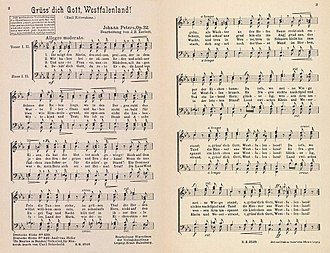Johann Peters (composer)
Peter Johann Peters (born March 13, 1820 in Breyell ; † July 7, 1870 in Cologne ) was a German musician and composer. The Westphalia song ("You may praise the Rhine, the proud one") is his most famous composition.
biography
Peter Johann Peters is the son of the Breyell musician and cloth merchant Christian Peters and his wife Christina Dohmen. The family was wealthy enough to send him to Cologne as a 15-year-old to the higher civil school , which he left without a qualification to devote himself to music. In 1837 he worked in Cologne as a violinist with the municipal orchestra, and during his service (from 1840) also as a military musician. Later he was appointed Kapellmeister at the Cologne City Theater. He also belonged to the Cologne Quartet , the Cologne Cathedral Chapel (which had been under the direction of Carl Leibl since 1826 ), but also appeared as a soloist. As a conductor he was active in numerous music associations in Cologne, in the revolutionary year of 1848 he led the music choir of the Citizens Parade , which emerged from the Cologne Citizens' Militia , and for the first time there is talk of his own compositions. In 1849/50 he was choirmaster of the opera choir.
According to a short biography of his son Moritz from 1935, he became Kapellmeister at the Stollwerckschen Vaudeville Theater in 1851 , and after the fire in the Cologne City Theater (1859), which ended its activity there, he founded the Gertrudenhof Orchestra with members of the theater band , of which he was director until 1864 . He is also said to have been conductor of the Larronge opera in Cologne ( Adolph L'Arronge was head of the theater from 1858 to 1863).
For health reasons he had to reduce his activities in public and give up completely in 1864, but was able to continue working as a music teacher. He died in 1870 at the age of 50.
Works
Of his compositions, only the Westfalenlied (Op. 23, 1868/69) based on a text by Emil Rittershaus are known, as well as the Rheinlied (“Strömt herbei, ihr Völkerscharen”, op. 3, 1867 during a festival in the Kölner Gürzenich improvised and printed in 1868) based on a text by Otto Julius Inkermann (CO Sternau). The Rheinlied was recommended for school lessons in the 7th and 8th grade in Prussia in 1912 - as part of the war education in the Empire - both songs were included in the Allgemeine Deutsche Kommersbuch , the New Songbook for Artillerymen (1893), the sport -Liederbuch (1921), the Rheinlied also in the German Army Songbook, the World War II song collection (1926) and the Wander songbook (1927). The popularity of the Rheinlied at the time is also indicated by the fact that JP Tonger'sche Musikalienhandlung paid 1,000 gold marks for the publishing rights in 1901 . Today the Rhine song can only be found in the songbook of the Cartel Association of Catholic German Student Associations (KV songbook), while the Westphalia song with Peters' melody is regionally widespread.
Other social songs were listed again in 1935, but no more is known of them as the title. In 2001 the family handed over the composer's estate, including five other printed song compositions, to the director of the district archive, Leo Peters . The opus numbers given show that at least three quarters of his compositions must continue to be considered lost.
family
In 1845 he married Auguste Cleff (or Clef, 1824–1871) in Cologne, daughter of a rentier , ie a presumably wealthy man. The couple had twelve children, seven of whom died in childhood.
His son Moritz Peters, who was born in Cologne in 1863, became mayor of Amern in 1890 and was mayor of Kaldenkirchen from 1899 to 1923 . He died in Lobberich in 1934 .
Trivia
The former Breyell town hall was declared the (representative) birthplace of Johann Peters in 1891 and 1935, against better judgment. A corresponding inscription board is still today above the front door.
literature
- Home book 1953 of the border district Kempen-Krefeld, p. 10
- A. Wolfgang Arbogast: The musician Johann Peters (1820–1870) from Breyell, in: Heimatbuch des Kreis Viersen 2001, pp. 85–96
- A. Wolfgang Arbogast: The estate of the musician Johann Peters (1820–1870) from Breyell in: Heimatbuch des Kreis Viersen 2003, pp. 39–50
Web links
- Works by and about Johann Peters in the German Digital Library
- Sheet music and audio files by Johann Peters (composer) in the International Music Score Library Project
Remarks
- ↑ However, these statements are not confirmed by the literature on Cologne's theater and music history
- ↑ https://www.volksliederarchiv.de/stroemt-herbei-ihr-voelkerscharen-nur-am-rheine/ or https://www.volksliederarchiv.de/ihr-moegt-den-rhein-den-stolzen-preisen -westfalenlied /
- ↑ The birth certificate names the nearby Haagstrasse as the family's residence
| personal data | |
|---|---|
| SURNAME | Peters, Johann |
| ALTERNATIVE NAMES | Peters, Peter Johann (full name) |
| BRIEF DESCRIPTION | German musician and composer |
| DATE OF BIRTH | March 13, 1820 |
| PLACE OF BIRTH | Breyell |
| DATE OF DEATH | July 7, 1870 |
| Place of death | Cologne |
